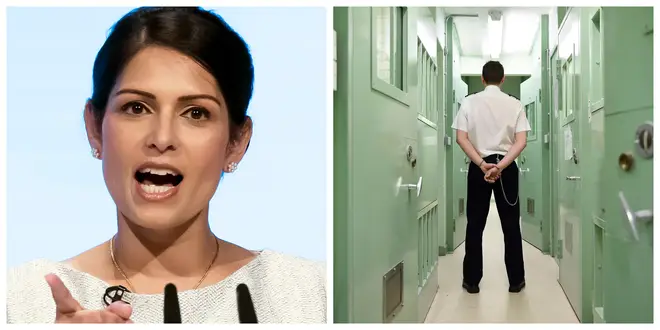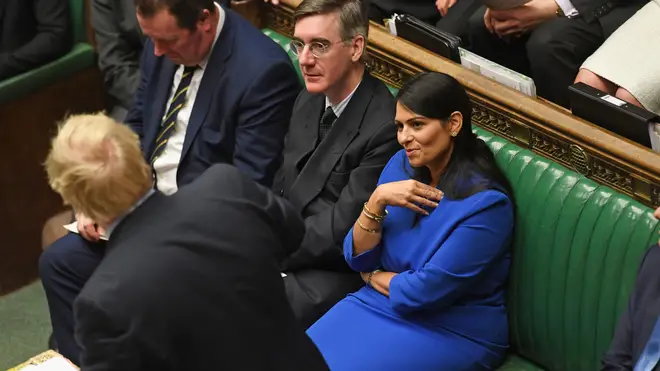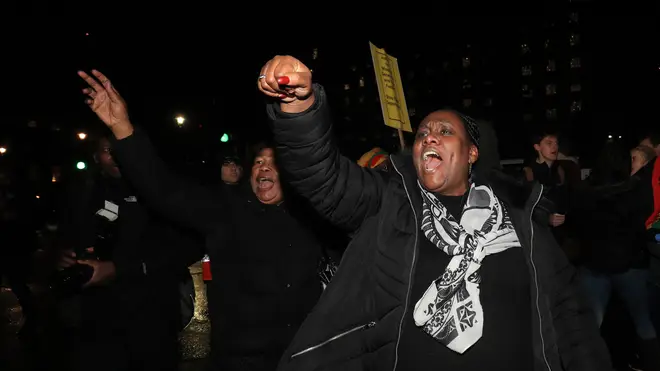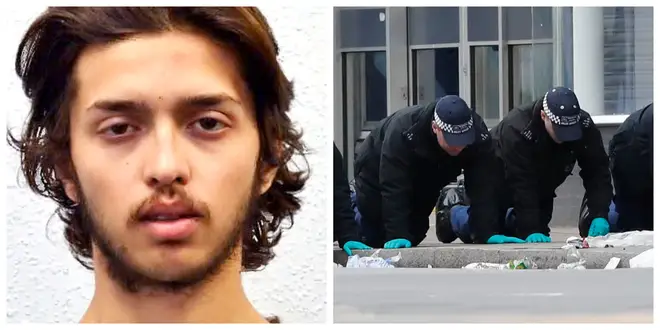
Tom Swarbrick 4pm - 7pm
12 February 2020, 20:34
Priti Patel has told LBC that the emergency anti-terror legislation being pushed through parliament on Wednesday is necessary to "keep people safe on the streets".
MPs passed the Terrorist Offenders (Restriction of Early Release) Bill through all its Commons stages on Wednesday and it will now progress to the Lords for further scrutiny.
The Home Secretary said: "As we saw in December last year, and just two weekends ago in Streatham, where we have had individuals that have been convicted for terrorist offences, they were released from prison early under the automatic early release scheme where they had no contact with a parole board, so no engagement whatsoever and they were then released from prison.
"That is what we want to stop. We want to stop terrorist offenders from leaving prison early and also from leaving prison without any engagement with a parole officer.
"So this legislation will change that stop the automatic early release of these offenders, these terrorist offenders, people that have committed very serious and significant crimes.

When questioned on the government's decision to react now rather than three months ago after the London Bridge attack outside Fishmongers Hall, Ms Patel said: "I think there are a number of steps obviously, that we can now take, we have the ability to legislate in the House of Commons, you know, it's a different situation.
"Even back in December when Fishmonger's Hall happened, I'll be very candid. I mean, I had to have discussions with the Prime Minister and the Lord Chancellor and absolutely spelt out that this type of situation is totally unacceptable. Our first duty is to protect the public.
"But of course in December, we were in a general election campaign. And this is now the earliest opportunity that we have had to take very clear and devise decisive action which is exactly what we are doing."

She continued: "This legislation puts the British public's protection first, make sure that terrorist offenders can no longer leave prison early under this auto release scheme, but also ensure that obviously we now have a parole board situation where every individual, every terrorist offender will go through a proper process.
"And since the election, this is our opportunity to legislate, we are absolutely doing that. I'll be quite candid. We are unapologetic as a government when it comes to taking action to protect the public.
"And absolutely, when it comes to terrorist offenders leaving prison early, it's an unacceptable situation.
"And this legislation absolutely deals with this cohort of individuals that were sentenced in the way in which they were where they could leave prison early and obviously not go through a parole board set up, now this is what we've got to change."
When questioned on the legality of the legislation, and the advice given by the Attorney General, Ms Patel stated: "These changes have gone through all the appropriate processes that you'd expect that the Ministry of Justice, in addition with the law commissioner and law officers, absolutely, and in fact, Robert Buckland, the Lord Chancellor made that very clear today on the floor of the House.
"These changes are essential if we are to keep the public safe, and whatever the circumstances, this is about keeping the public safe."

Speaking about the deportation of a number of criminals to Jamaica earlier this week, Ms Patel said: "Well, I think the first thing that I would say, I'm unapologetic about protecting the British public, people that have been convicted of serious offences, and when I say serious offences, this includes manslaughter.
"This includes rape. This includes sexual offences against children, domestic violence, domestic abuse, just the most abhorrent crimes. It is right, that we deport individuals under the laws that we have the statutes in Parliament. And that is effectivly what we are doing."
When challenged over whether she acted lawfully, she responded: "I have acted lawfully, in accordance with the 2007 Act. With regards to foreign national offenders. Let's be very clear about this."
She added that the 2007 law gives the Home Secretary a duty to deport foreign national offenders who have served a prison sentence of 12 months or more.
"When it comes to the courts, it is disappointing basically, that they have stopped the British government from deporting people that are a threat to the British public."
She added that those who the government were attempting to deport had committed serious offences.
When LBC asked if the Cout of Appeal "got it wrong," the Home Secretary said: "The Court of Appeals they have not taken into consideration the extent of criminality of the individuals and the absolute issue and trauma around the victims of these awful crimes."
She added the government would be challenging the decision of the court.

The Terrorist Offenders (Restriction of Early Release) Bill was introduced to the Commons on Tuesday, and Jacob Rees-Mogg, the Leader of the House indicated ministers expected peers to facilitate its swift passage.
The legislation is expected to pass through the Commons by the end of Wednesday.
The government want to make the legislation law by February 27, which is the date the next terrorist prisoner comes up for release.
The move comes in the wake of the Streatham terror attack when released jihadist Sudesh Amman stabbed two bystanders with a knife he had grabbed from a shop.
Amman had been jailed by counter-terror police for possessing and distributing terrorist documents in December 2018, but was freed midway through his sentence just ten days before his knife rampage.
Just three months earlier convicted terrorist Usman Khan stabbed and killed two people at Fishmongers' Hall near London Bridge in November.
He had been released nearly a year earlier halfway through a 16-year jail sentence.
While the government have less control over the process once it leaves the Commons and reaches the Lords Jacob Rees-Mogg told MPs the need for the legislation to be enshrined in law was clear.
"The urgency and the message coming from this House is very clear to them and therefore I expect them to handle this in a reasonable manner," he told MPs.
The plans, which will affect around 50 prisoners, aim to make sure terrorist offenders serve two-thirds of their sentence before they are considered eligible for release, rather than the current halfway mark.
Before being freed they would need to be reviewed by a panel of specialist judges and psychiatrists at the Parole Board.